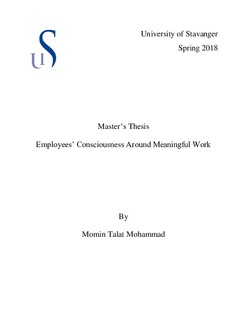| dc.contributor.advisor | Solli, Ingeborg | |
| dc.contributor.author | Talat Mohammad, Momin | |
| dc.date.accessioned | 2018-09-25T07:48:26Z | |
| dc.date.available | 2018-09-25T07:48:26Z | |
| dc.date.issued | 2018-06-15 | |
| dc.identifier.uri | http://hdl.handle.net/11250/2564218 | |
| dc.description | Master's thesis in Strategy and Management | nb_NO |
| dc.description.abstract | This study aims to investigate employees’ consciousness around meaningful work via a quantitative research methodology, to try and find out if employees are conscious about the work having a meaning and if certain employee characteristics show signs of more consciousness around meaningful work. This research question is broken down into three sub-questions: (1) Does meaningful work affect employees’ efforts while at work? (2) Does meaningful work affect employees’ attendance? (3) Were people conscious about meaningful work when they made their career choice? In the recent few decades, discussion about motivation started emerging in organizations. Theories emphasizing organizational performance, system, and productivity has made way for emerging theories about intrinsic motivation, for instance meaning, purpose, job satisfaction, and commitment, and how these factors work as motivators on employees. Additionally, statistics show that organizations experience change in the bottom line as a result of change in motivation among employees. A survey was conducted via an online platform and sent out to people via social media. Based on a sample size of a hundred and nine respondents, this study found out that the majority of employees were conscious about meaningful work, although it was very difficult to pinpoint exact characteristics that made certain people more conscious around meaningful work. Meaningfulness affected efforts, although it was not possible with the current dataset to claim that there were any certain employees whose efforts were more likely to be affected. Surprisingly, meaningful work did not affect attendance, but there were reasonable explanations for this. The majority of people were conscious regarding career choice and meaningful work, and many people pursued what they initially believed was meaningful. Reassuringly, those who were more conscious about meaningful work were less likely to be financially incentivized. | nb_NO |
| dc.language.iso | eng | nb_NO |
| dc.publisher | University of Stavanger, Norway | nb_NO |
| dc.relation.ispartofseries | Masteroppgave/UIS-HH/2018; | |
| dc.rights | Attribution-NonCommercial-NoDerivatives 4.0 Internasjonal | * |
| dc.rights.uri | http://creativecommons.org/licenses/by-nc-nd/4.0/deed.no | * |
| dc.subject | økonomi | nb_NO |
| dc.subject | administrasjon | nb_NO |
| dc.subject | strategi og ledelse | nb_NO |
| dc.subject | work | nb_NO |
| dc.subject | strategi | nb_NO |
| dc.subject | ledelse | nb_NO |
| dc.title | Employees' Consciousness Around Meaningful Work | nb_NO |
| dc.type | Master thesis | nb_NO |
| dc.subject.nsi | VDP::Samfunnsvitenskap: 200::Økonomi: 210::Bedriftsøkonomi: 213 | nb_NO |

